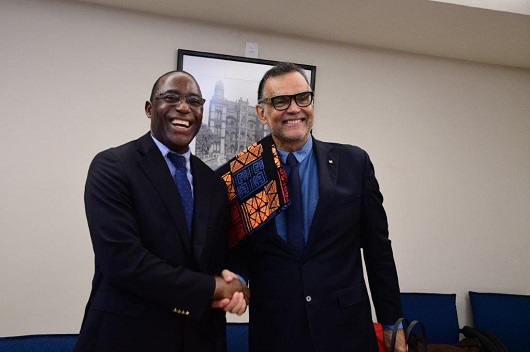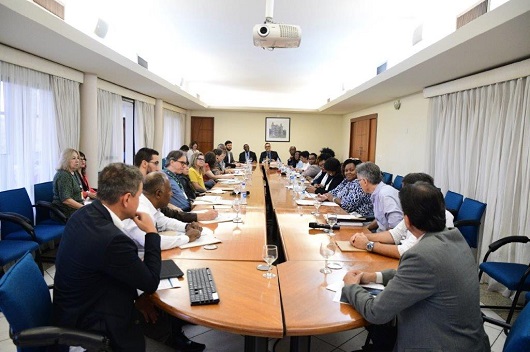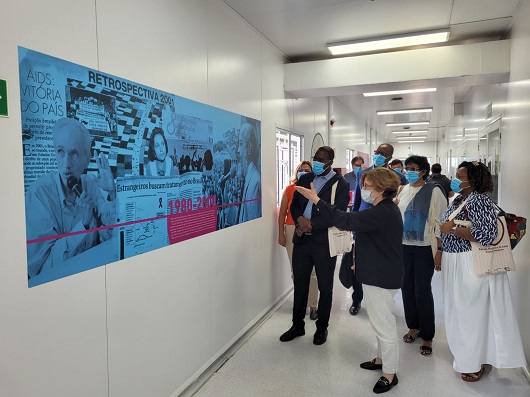Mozambican Minister of Health visits Fiocruz to expand and define areas of cooperation
13/11/2023
Cristina Azevedo (Fiocruz News Agency)
One of the most successful examples of Fiocruz's cooperation with Portuguese-speaking countries in Africa, Mozambique should see these ties grow even closer as a result of the visit of its minister of Health, Armindo Daniel Tiago, to the Manguinhos Campus last Monday (11/6). Accompanied by a delegation of eight members from different Mozambican institutions, the minister spoke with president Mario Moreira and representatives from at least ten of the Foundation's units to define priorities. At the end of the day, three main axes began to emerge: research, training and technical assistance.
The Minister of Health, Armindo Tiago, was welcomed by Fiocruz president, Mario Moreira (photo: Peter Ilicciev)
"Mozambique is, for us, an example of good structuring cooperation", said Moreira, recalling the postgraduate program, which has already graduated more than 60 Mozambican masters in recent years, as well as the implementation of the medicines factory in the capital, Maputo. "Our cooperation in Mozambique is a model that can be replicated in other countries".
Minister Tiago and his delegation brought priorities to be discussed, such as the fight against malaria, one of the country's main health problems; primary care; the structuring of epidemiological surveillance; maternal mortality; and training courses covering from drug regulation to equipment maintenance technical courses. "I am happy to see Brazilians committing Mozambique", said the minister. "We have excellent ideas that need to be transformed into concrete actions and results. The most important thing is the impact they will have on the health of our people".
Specialization courses
The minister's visit began to take shape after the visit of the director of Mozambique's National Institute of Health (NIH), Eduardo Samo Gudo, in August. Gudo, who carried out his doctorate at Fiocruz, highlighted the Foundation's role in developing the NIH, and establishing surveillance systems and technological platforms. The institute performs some functions similar to those of Fiocruz, such as supporting public policies through research, technological development, reference services and the training of human resources.
Fiocruz has had an office in Mozambique since 2008, and one of the most active areas of cooperation has been in education, with courses from technical to postgraduate level. Cristina Guilan, General Education Coordinator at the Vice-Presidency for Education, Information and Communication (VPEIC/Fiocruz), pointed out that courses can be designed according to the reality of Mozambique. And she recalled that through the Virtual Campus, many of them can be accessed from anywhere, which would make it easier for people from more remote areas of the country.
With a delegation of eight members from different Mozambican institutions, the minister spoke with representatives from at least ten Fiocruz units (photo: Peter Ilicciev)
Valdiléa Veloso, director of the Evandro Chagas National Institute of Infectious Diseases (INI/Fiocruz), recalled that the subject of education encompasses not only units such as the Sergio Arouca National School of Public Health (ENSP/Fiocruz) and the Joaquim Venâncio Polytechnic School, but several others as well, each with their own specializations. "It is important to deepen cooperation in research and training in infectious diseases. We have specialization courses for foreign physicians". said Valdilea.
This is not an isolated initiative. The professional master's program at the Immunobiological Technology Institute (Bio-Manguinhos/Fiocruz), with vacancies for African countries, was also mentioned at the meeting. Antonio Eugenio Castro Cardoso Almeida, director of the National Institute for Quality Control in Health (INCQS/Fiocruz), said that he had already received master's and doctoral students from Mozambique, and that the unit was open to increasing interaction with Mozambican institutions.
The Director of ENSP, Marcos Menezes, highlighted the school's long tradition of cooperation with Mozambique, emphasizing that learning is mutual, while Anamaria Corbo, director of EPSJV, stressed the importance of students who participate in the cooperation replicating the lessons learned on their return to the country. She recalled that Poli is currently the executive secretary of the Network of Technical Schools, with a sub-network formed by the Community of Portuguese Language Countries (CPLP). The ENSP, in turn, acts as the executive secretariat of the CPLP Network of National Schools of Public Health.
Focus on needs
Mozambique has 33 million inhabitants, 5,000 of whom are physicians. Of these, only a thousand have specialized, said the minister. Maternal mortality stands at 400 per 100,000, hence the need to expand the training of health professionals and facilitate access to medical care. These are data based on the country's needs that will guide cooperation. Based on the three axes outlined, new actions will be developed.

The Mozambican delegation visited Fiocruz units, such as the Evandro Chagas National Institute of Infectious Diseases Hospital Center (photo: Cristina Azevedo)
Tiago was accompanied by a predominantly female delegation, which also included the director of Planning and Cooperation, Sãozinha Agostinho; the deputy national director of Training of Health Professionals, Bernardina de Sousa; the director of the Provincial Health Services of Nampula, Munira Abudu; the director of the Provincial Health Services of Maputo, Yolanda Santo Tchambo; the director of the Provincial Health Services of Tete, Carla das Dores Mosse; the executive administrator of the National Medicines Regulatory Authority (NMRA), Ligia Tembe; and the minister's assistant, Eunica Pires.
In addition to the meeting at the Official Residence, the delegation from Mozambique visited other Fiocruz units, such as the Sergio Arouca National School of Public Health (ENSP/Fiocruz), the Joaquim Venâncio Polytechnic School (EPSJV/Fiocruz), the National Institute for Quality Control in Health (INCQS/Fiocruz), the Evandro Chagas National Institute of Infectious Diseases (INI/Fiocruz), the INI Hospital Center, and the Immunobiological Technology Institute (Bio-Manguinhos/Fiocruz) to map out areas for cooperation.
"We have an important homework to do now", said Augusto Paulo Silva, coordinator of the Fiocruz-Africa Office based in Mozambique and linked to the Center for International Relations in Health (CRIS/Fiocruz).




